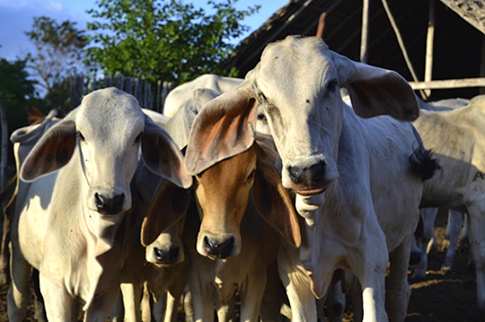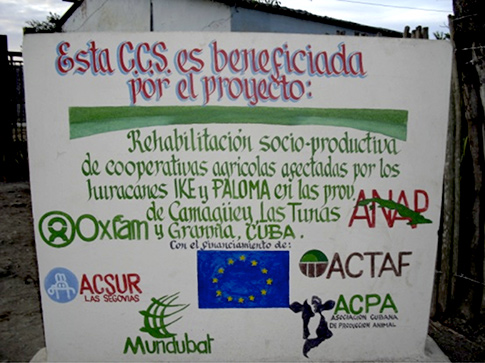Post-hurricane: Sustainability and Resilience in Cuba
Abel Veiga Esperon was not afraid of hurricanes until Paloma hit, a day forever etched in his mind. The 53 year old farmer took refuge with nine co-workers in the office at La Baobita, the cooperative in Santa Cruz del Sur in eastern Cuba where he had been in charge for two decades.
“It got really ugly – things were flying everywhere, shrubs were flying, windmills were flying,” Abel recalls. “The sea water made it all the way here. Our big communal dining table landed on top of the office. I was not afraid of hurricanes…until that day.”
La Baobita was one of 78 cooperatives destroyed by hurricanes Ike and Paloma in 2008 that were rehabilitated with the help of supplies and training from a $2 million Oxfam project delivered by several local and international partner organizations, and co-funded by the European Union.
La Baobita was not only rebuilt, it flourished into one of the top cooperatives in the province of Camaguey. The project also introduced new sustainable methods of production, increased availability of fresh meat and dairy products for local consumption, and boosted the resilience of local communities to natural disasters.
“Fewer cows are dying, from 44 in 2009 to only eight this year, due to better access to water and better protection because of the zinc shingles. We are producing 10,000 more liters of milk and have diversified our crops and animals to include chickens for meat and eggs.”
Getting resources like wire and a machete was essential for producers who had nothing
The project reached La Catalina, one of the poorest, most isolated regions of Las Tunas province. Farmers of La Catalina were already having difficulty making a transition from sugar to food production when hurricane Ike hit.
“It was really sad,” recalled the director of a local cooperative. “When I walked around the morning after and saw so much destruction, and when we already need so much… and I had to tell those that had been evacuated 'You no longer have a roof, your house was destroyed…”
He heard about the resources available through the Oxfam project during food distribution to the evacuees. Among the resources were wire to fence in family farms, machetes, the use of a tractor, boots, large pitchers and trailers to collect and transport milk and limestone.
“Equipment and wire were the resources that we needed the most. Because of the help we received, farmers are working with more spirit and motivation. We feel responsible and committed.”

Truck is the life of the community
Maria Perez was the economist of a small cooperative outside of Manatí in the province of Las Tunas.
“The hurricane hit and our animals got sick; we were only able to produce and sell some fruit and vegetables. We had to ask for credit to pay the workers.”
A windmill, shingles and other supplies and assistance enabled Maria's cooperative to recover and increase production by 158% by 2012. But it's a truck that made the biggest difference:
“We are very isolated where we are and there is no transportation. Now with the truck the producers can go to town to sell their produce and do the things they need to do without worrying about getting lost or not making it back. The truck is the life of the community.”

Thanks to those who shared their stories of how this Oxfam project helped rehabilitate their cooperatives in Santa Cruz del Sur, La Catalina and Manatí from the devastation of hurricanes Ike and Paloma. The $2 million project implemented in the provinces of Camaguey, Las Tunas and Granma, Cuba was co-funded by the European Union and involved the collaboration of international partners Oxfam and Spanish NGOs Mundubat and ACSUR, and local partners, the National Association of Small Farmers (ANAP), the Cuban Association of Animal Production (ACPA) and the Cuban Association of Agricultural and Forest Technicians (ACTAF).

